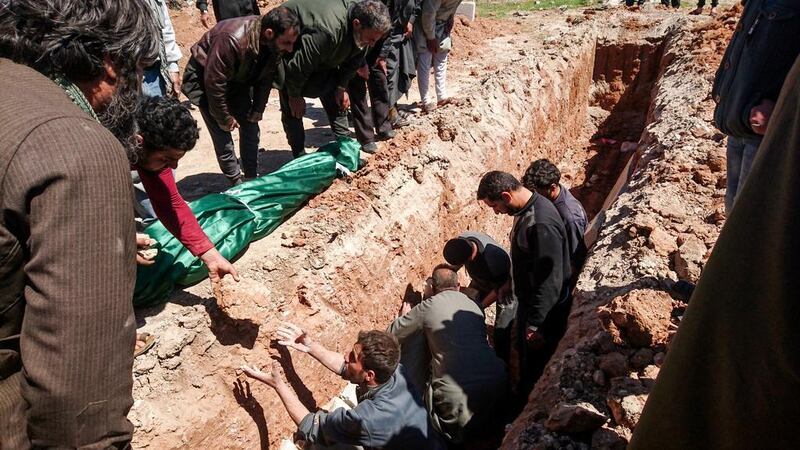No one can begrudge Syrians their moments of joy. And Tuesday was a joyous day for the country. Sports fans across the country assembled before televisions to watch their national football team take on Iran in a world cup qualifying match at Tehran's Azadi stadium. The match ended with Omar Al Somah scoring a dramatic goal to equalise, keeping alive Syria's hope of entering the Fifa World Cup for the first time. Hours after the match ended, Syria's armed forces, aided by Hizbollah fighters, broke ISIL's siege of Deir Azzor, Mr Al Somah's home city.
_________________
Read more
[ Syria's improbable World Cup dream amid ongoing political turmoil ]
[ Divisions run deep among Syria football fans despite World Cup success ]
[ UN investigators say Assad carried out sarin gas attack on Khan Sheikhoun ]
_________________
Some interpreted the jubilant celebrations brought on by these dual achievements as an outbreak of "unity" in a country riven by conflict. This proved to be a misreading. The following day, United Nations investigators revealed that Bashar Al Assad, Syria's president, had used a Russian-built plane to carry out a sarin gas attack in April on the town of Khan Sheikhoun that killed 83 Syrians, including 23 women and 28 children, and left thousands more traumatised.
The Syrian government had argued after the attack that it was targeting a chemical weapons facility, and not deliberately gassing its people. The United Nations categorically rejected this claim on Wednesday, saying that it was “extremely unlikely that an air strike would release sarin potentially stored inside such a structure in amounts sufficient to explain the number of casualties recorded”.This is the first time that the UN has directly condemned the Al Assad government. The United States retaliated to the killings in Khan Sheikhoun by bombing the Syrian government’s military assets. But it was at best a superficial punishment, causing more harm to civilians than to the government. In the months that followed, Mr Al Assad has been able to consolidate his authority and solidify his grip over the country.
_________________
More from Opinion on Syria
[ Shadi Ghanim's cartoon about United Nations investigators confirming sarin gas attacks in Syria ]
_________________
The world should not make the mistake of equating Mr Al Assad's suffocating control over the Syrian people with national unity. State control is imposed from above and demands conformity; national unity spreads from below and produces organic cohesion. As Stefan de Mistura, the UN Special Envoy for Syria, said in Geneva on Wednesday, Mr Al Assad's military triumphs do not mean that Syria now has alighted on a "sustainable political long-term solution". In other words, Mr Al Assad's power to coerce his people does not confer legitimacy on his rule. All it does is paper over the fissures that, if not addressed, will only prolong and even worsen the suffering of the Syrian people. Those fractures will not heal as long as Mr Al Assad, who caused them, presides over Syria. The fate of the Syrian people cannot be left in the hands of a man who gasses them to death. What the world witnessed on Tuesday was not an onset of "unity" in Syria. It was a momentary escape from terror.
Follow The National's Opinion section on Twitter





